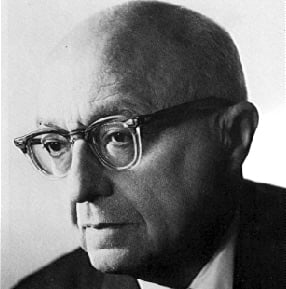Rhythms (Section I)
The stars are hidden,
the lights are out;
the tall black houses
are ranked about.
I beat my fists
on the stout doors,
no answering steps
come down the floors.
I have walked until
I am faint and numb;
from one dark street
to another I come.
The comforting
winds are still.
This is a chaos
through which I stumble,
till I reach the void
and down I tumble.
The stars will then
be out forever;
the fists unclenched,
the feet walk never,
and all I say
blown by the wind
away.
This poem is in the public domain. Published in Poem-a-Day on August 12, 2023, by the Academy of American Poets.
Charles Reznikoff’s Rhythms was privately printed in 1918 and again in 1927, the second time as a part of the larger collection Five Groups of Verse. In “A Story of Vocation: Charles Reznikoff’s Rhythms (1918),” Robert Franciosi, a professor in the department of English at Grand Valley State University, writes, “Rhythms begins in darkness. It is a darkness of lost hope, of an inability to articulate the words which will bring comfort. Reznikoff establishes this mood by beginning the volume with a revised version of a poem originally [titled] ‘Futility.’ The futility of the poem is in the speaker’s failure to find solace in an Eliotic setting of dark and windy streets. It is the very darkness of the scene which he cannot overcome [. . .]. The fatigue and hopelessness of the speaker is expressed in the movement of the poem as the verse pauses over these two lines which are in the middle of the six quatrains: ‘The comforting / Winds are still.’ After these lines there is a split as the poem shifts from present to future tense. The speaker anticipates the final darkness of death, in which all of his actions in life will have seemed futile. It is significant that the poem ends on the words of the speaker and their fragile nature [. . .]. More fragile than the physical body is the fate of unattended words.”

